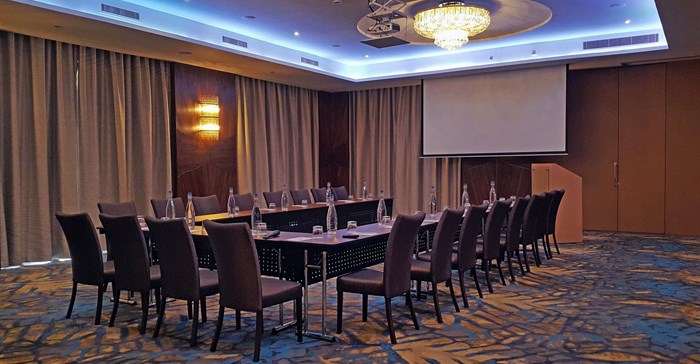Green event and conference planning have become an established trend within the global tourism and MICE industries. Conferences and events have a significant impact on the communities and the environment where they are hosted - some good, some bad. While they may boost the local economy, they can also overwhelm local infrastructure, leave behind waste, environmental degradation, air pollution, habitat destruction, generate a huge amount of greenhouse gas emissions - leaving behind a big carbon footprint - to name a few. So, what is the right way to address sustainability?
‘Event greening’ or ‘sustainable event management’ applies environmentally preferred practices that minimise the environmental burdens to all related activities like venue selection, accommodation, travel, catering, waste management, resources and suppliers, and energy.

Image Supplied
The Venue
Probably the most important step towards implementing a green event is the choice of venue which will determine the overall environmental impacts of the event, such as energy and water used and the waste generated by delegates and catering operations. Selecting venues that have obtained environmental certification provides assurance that the environmental impact of the event will also be reduced.
Andre Harms, a sustainability engineer and founder of Ecolution Consulting who played an integral part in building green hotels Hotel Verde Cape Town and Hotel Verde Zanzibar, says that travellers and conference delegates are becoming more and more attuned to green accommodation and actively look for hotels that are operated sustainably.
Carbon offsetting
As climate change gains more attention around the world, a renewed focus on carbon emissions has emerged. Consumers are becoming more and more conscious of their carbon footprint, and are beginning to look for ways to reduce their impact on the planet – to eventually become carbon-neutral.
The single biggest contributor to an event’s carbon footprint is travel, therefore location and access are essential factors when selecting an event venue. Carbon offsetting enables anyone to offset or neutralise a specific carbon footprint (i.e.: an event or travel) by means of supporting projects, typically energy efficiency, renewable energy, tree planting, etc. that either reduce or offset carbon dioxide emissions in the atmosphere. This effectively means that the negative amount of carbon created is apportioned to the offsetting entity, event or development.
Accommodation
When choosing accommodation from hotels and other accommodation providers, particularly suitable are those that have environmental certification as they demonstrate compliance with environmental standards and can guide the event planner on more precise impact assessment and carbon accounting.
Guy Johnstone, general manager at Hotel Verde Zanzibar, says that guests are also incentivised and encouraged to be “green-savvy” whilst staying at the hotel by:
• Making use of the power-generating gym equipment (Phase 2)
• Re-using towels
• Separating waste in the split bins for recycling
• Taking the stairs instead of the elevator
• Walking or cycling to see the sights
Catering
When it comes to menu planning, the choice of locally sourced organic and seasonal produce - even providing vegetarian dishes - will reduce the environmental impact and benefit communities.
When arranging catering for an event, planning to prevent waste is essential. The number of delegates should be confirmed as precisely as possible, to avoid the preparation of too much food - half portion and children’s menus should also be available.

Image Supplied
Technology and lighting
Many new technologies offer improved efficiency, size and power requirements, especially for AV equipment, speakers and amplifiers – use of older, less efficient systems should be avoided.
Using natural light as much as possible is preferential as lighting is a substantial user of electricity, and care must be taken to design a lighting solution that minimises the use of energy. The use of effective and efficient lighting control, for example, ensures lights are only on when and where, and to the extent, they are needed, without sacrificing the needs of the event.
Event materials
Large volumes of printed materials are generated for most meetings and events but with information technologies widely available, most of the communication functions can and should be carried out electronically. Promotional emails, electronic invitations, registration, information packs and meeting documents can be provided on memory sticks or be available to download online.
If printing is necessary – print double-sided, using recycled paper and vegetable ink – font selection and printer settings can further reduce ink consumption. Any gifting or branded materials, such as pens, folders, etc. whilst best avoided, should be made of biodegradable, recycled and sustainably sourced materials, preferably from local suppliers.
Promoting responsible and sustainable events tourism
There is no outright authority that tells an event planner exactly what to do and how to address sustainability when planning an event, but there are many associations at their disposal to assist and give guidance as to how to build sustainability into the event planning process. There are also easy-to-use carbon footprint calculators where you can enter details about attendee travel, the venue and meals to get an approximate measurement of the carbon impact created by an event.
Harms highlights the importance of incorporating environmental considerations throughout all stages of an event in order to minimise the negative impact on the environment and positively contribute towards the community. He adds that the hospitality industry should be incorporating green building practices, strategies and operations into its hotels to present a completely sustainable offering in support of the worldwide green movement and to assist in promoting responsible tourism.
“Sustainability profits not only the organisation but the global environment too,” he emphasises.













































